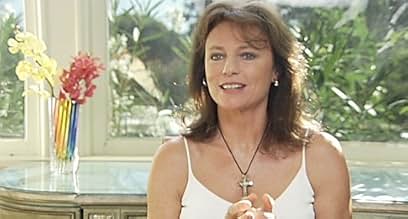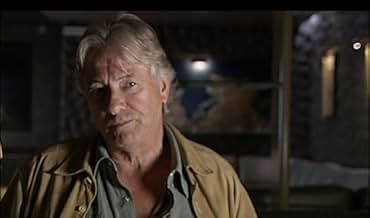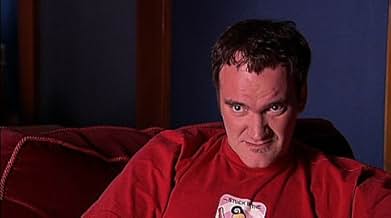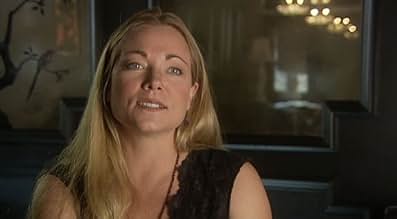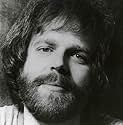Z Channel, une magnifique obsession
Original title: Z Channel: A Magnificent Obsession
IMDb RATING
7.6/10
1.8K
YOUR RATING
The story of Z Channel, one of the first U.S. pay cable stations and its programming chief, Jerry Harvey. Debuting in 1974 in LA, their eclectic slate of movies became a prime example of the... Read allThe story of Z Channel, one of the first U.S. pay cable stations and its programming chief, Jerry Harvey. Debuting in 1974 in LA, their eclectic slate of movies became a prime example of the untapped power of cable television.The story of Z Channel, one of the first U.S. pay cable stations and its programming chief, Jerry Harvey. Debuting in 1974 in LA, their eclectic slate of movies became a prime example of the untapped power of cable television.
- Awards
- 1 win & 1 nomination total
Jerry Harvey
- Self - Program Director, Z Channel
- (archive footage)
Featured reviews
It's doesn't take a genius to see why the Independent Film Channel would finance this documentary. Basically the Z Channel was the first movie channel to play independent, little seen, and foreign films. Featuring interviews with directors Quentin Tarantino, Robert Altman, and Alexander Pane, "Z Channel: A Magnificent Obsession" focuses on the effect the channel had on the film industry.
The station had among it's subscribers some of the biggest names in Hollywood. What I found fascinating about this film is the power a cable channel can have. For example James Woods credits his Oscar nomination to the Z Channel's constant playing of the little seen movie "Salvador" to the right people.
As a film geek I also enjoyed the generous amount of film clips by director Cassavetes. The film turned me on to movies like "Bad Timing" and "F is for Fake".
The station had among it's subscribers some of the biggest names in Hollywood. What I found fascinating about this film is the power a cable channel can have. For example James Woods credits his Oscar nomination to the Z Channel's constant playing of the little seen movie "Salvador" to the right people.
As a film geek I also enjoyed the generous amount of film clips by director Cassavetes. The film turned me on to movies like "Bad Timing" and "F is for Fake".
This fascinating documentary portrays the work and life of early cable-TV programming genius, Gerry Harvey, whose Z Channel had attracted a substantial 'cult' following in metro LA at the dawn of the cable TV era into the late '80s. It is also a re-view/revue of many of the finest films of Z Channel's generation and earlier. The finest, often augmented by the weirdest too (e.g., Russ Meyer festivals and the 'soft porn' of those earlier times).
The biographical portions of the documentary -- Harvey's rise from ultra geek to film aficionado, then exhibitor/promoter, all amidst emotional chaos -- are all very interesting, and also tragic. Even more interesting is the history of how The Z Channel was launched, built, ... and eventually lost.
This documentary presents fascinating stories about movies and filmmakers. Michael Cimino's story is a good example. A good friend of Harvey's, Cimino had earned financial support and a free hand by making the incomparable Best Picture, "The Deer Hunter", and then destroyed his credibility & career by his excesses in filming the underrated Heaven's Gate. Through that time, his life was intertwined with Harvey's, presenting unique perspective on the unfolding events.
Harvey not only knew films, and had exceptional taste; he also had the courage and ingenuity to discover and present films (often 'director's cuts) in relentlessly creative, compelling programming. Excellent and important films that have otherwise been overlooked -- like Bertolucci's '1900' and Cimino's Heaven's Gate -- were shown with success by Harvey. One weekend there might be a Truffaut festival, the next perhaps Spaghetti Westerns or the Marx Brothers. Seemingly no genre was ignored; Harvey trusted his audience to watch with open minds and receptive hearts, to respond to great and quirky films, ...and to spread the word and keep the fledgling channel alive and growing. After his death (portrayed compellingly in interviews within the documentary), the station went into decline -- including the desperate step of incongruently showing sporting events (!) in alongside the great film programming. After all, wasn't that part of HBO's success?! Yikes. So sad.
Yet, the greatest joy of this documentary is neither the biography nor the story of Z -- it is the extraordinary range of film clips from the huge range of programming that the Z Channel broadcast.
The visual quality of the documentary is variable, from great to low-grade. But for me, at least, this technical 'weakness' could not undercut a fascinating tour of movies and a devotee who made his taste count. (Indeed, sometimes the "degraded" video imagery was itself a point of interest and beauty.) With apologies to the pretty good Independent Film Channel and the sometimes delightful Turner Classic Movies, the Z Channel appears far better than any station I have seen. I was oblivious to it at the time, so this film was a revelation to me.
The biographical portions of the documentary -- Harvey's rise from ultra geek to film aficionado, then exhibitor/promoter, all amidst emotional chaos -- are all very interesting, and also tragic. Even more interesting is the history of how The Z Channel was launched, built, ... and eventually lost.
This documentary presents fascinating stories about movies and filmmakers. Michael Cimino's story is a good example. A good friend of Harvey's, Cimino had earned financial support and a free hand by making the incomparable Best Picture, "The Deer Hunter", and then destroyed his credibility & career by his excesses in filming the underrated Heaven's Gate. Through that time, his life was intertwined with Harvey's, presenting unique perspective on the unfolding events.
Harvey not only knew films, and had exceptional taste; he also had the courage and ingenuity to discover and present films (often 'director's cuts) in relentlessly creative, compelling programming. Excellent and important films that have otherwise been overlooked -- like Bertolucci's '1900' and Cimino's Heaven's Gate -- were shown with success by Harvey. One weekend there might be a Truffaut festival, the next perhaps Spaghetti Westerns or the Marx Brothers. Seemingly no genre was ignored; Harvey trusted his audience to watch with open minds and receptive hearts, to respond to great and quirky films, ...and to spread the word and keep the fledgling channel alive and growing. After his death (portrayed compellingly in interviews within the documentary), the station went into decline -- including the desperate step of incongruently showing sporting events (!) in alongside the great film programming. After all, wasn't that part of HBO's success?! Yikes. So sad.
Yet, the greatest joy of this documentary is neither the biography nor the story of Z -- it is the extraordinary range of film clips from the huge range of programming that the Z Channel broadcast.
The visual quality of the documentary is variable, from great to low-grade. But for me, at least, this technical 'weakness' could not undercut a fascinating tour of movies and a devotee who made his taste count. (Indeed, sometimes the "degraded" video imagery was itself a point of interest and beauty.) With apologies to the pretty good Independent Film Channel and the sometimes delightful Turner Classic Movies, the Z Channel appears far better than any station I have seen. I was oblivious to it at the time, so this film was a revelation to me.
I saw this film at the 2004 Toronto International Film Festival. The daughter of the late filmmaker John Cassavetes and actress Gena Rowlands, Xan (Alexandra) Cassavetes grew up surrounded by the culture of film. But in her teens, she began to form her own taste, thanks in part to an innovative Los Angeles area cable channel. Z Channel began in 1974, long before there was a Blockbuster Video on every block, and it showed both neglected American films as well as the greats of European cinema. Xan set out to make a straight documentary about the channel, and in the process found a whole other story.
Jerry Harvey was a film geek's film geek. He joined Z Channel in 1980 after programming films for a local art-house cinema. Under Harvey's direction, Z Channel really took off, competing against heavyweights like HBO. While remaining a local treasure, Z Channel's influence was disproportionate to its subscriber base, since so many filmmakers lived in the LA area. Harvey was a friend and champion of such filmmakers as Sam Peckinpah, Henry Jaglom, Michael Cimino, Robert Altman, and Paul Verhoeven, and was one of the first to show "director's cuts" of such misunderstood films as Heaven's Gate, Once Upon A Time In America, and The Wild Bunch. But he was also a deeply troubled man. His obsessive nature fuelled his work, but it often led to bouts of crushing depression. His mood swings culminated in a terrible tragedy in 1988 when he killed his wife and then took his own life. Remembrances from his friends are still fraught with grief and anger, more than fifteen years later.
While at first, I wondered if I were seeing two films (a portrait of Jerry Harvey, and an appreciation of overlooked films), I realized that the beauty of Cassavetes' film is that she's celebrating the life and achievements of Jerry Harvey by talking about some of the films that he brought to her attention through Z Channel. Not his tragic end, but what came before. So often, when a life ends in tragedy or violence, we only remember that part. Sure, you could call Harvey a murderer. But he was also an incredible film lover and filmmaker's advocate, someone who had a wide ranging influence as well as a group of loyal friends who are still reeling from his loss.
Z Channel only lasted about a year after Harvey's death, and the many people interviewed (Quentin Tarantino, James Woods, Theresa Russell, Paul Verhoeven, Robert Altman, and Jacqueline Bisset among them) seem almost as wistful about the death of a certain era in cable television as of their friend Jerry Harvey.
P.S. It seems fitting that I should end my 2004 Toronto International Film Festival experience with a film about a TV channel that director Henry Jaglom described as "like a film festival in your house every night."
Jerry Harvey was a film geek's film geek. He joined Z Channel in 1980 after programming films for a local art-house cinema. Under Harvey's direction, Z Channel really took off, competing against heavyweights like HBO. While remaining a local treasure, Z Channel's influence was disproportionate to its subscriber base, since so many filmmakers lived in the LA area. Harvey was a friend and champion of such filmmakers as Sam Peckinpah, Henry Jaglom, Michael Cimino, Robert Altman, and Paul Verhoeven, and was one of the first to show "director's cuts" of such misunderstood films as Heaven's Gate, Once Upon A Time In America, and The Wild Bunch. But he was also a deeply troubled man. His obsessive nature fuelled his work, but it often led to bouts of crushing depression. His mood swings culminated in a terrible tragedy in 1988 when he killed his wife and then took his own life. Remembrances from his friends are still fraught with grief and anger, more than fifteen years later.
While at first, I wondered if I were seeing two films (a portrait of Jerry Harvey, and an appreciation of overlooked films), I realized that the beauty of Cassavetes' film is that she's celebrating the life and achievements of Jerry Harvey by talking about some of the films that he brought to her attention through Z Channel. Not his tragic end, but what came before. So often, when a life ends in tragedy or violence, we only remember that part. Sure, you could call Harvey a murderer. But he was also an incredible film lover and filmmaker's advocate, someone who had a wide ranging influence as well as a group of loyal friends who are still reeling from his loss.
Z Channel only lasted about a year after Harvey's death, and the many people interviewed (Quentin Tarantino, James Woods, Theresa Russell, Paul Verhoeven, Robert Altman, and Jacqueline Bisset among them) seem almost as wistful about the death of a certain era in cable television as of their friend Jerry Harvey.
P.S. It seems fitting that I should end my 2004 Toronto International Film Festival experience with a film about a TV channel that director Henry Jaglom described as "like a film festival in your house every night."
Z Channel was a Los Angeles pay-tv channel run by one Jerry Harvey. His devotion to cinema as art, broadcasting uncut (directors' versions) of films or other worthy efforts sidelined by the studios or TV channels that interspersed them with advertising, earned him the enduring respect of a multitude of Hollywood greats, many of whom are interviewed in this touching movie. One wonders if he had lived in France or even Latin America perhaps their might have been a public outcry to defend an institution he created, rather than lawsuits. In USA and Britain there is a lethargy, an apathy for cinema as art art is viewed as almost a luxury item, something that is nice but hardly necessary. What do we need to do to ignite a fire in the hearts of students and film aficionados? What do we need to do to bring about a cultural revolution where the people who appreciate art can nurture and control it, rather than those that make money from it, or government ministers of culture' who, lacking sufficient conviction themselves, are also unable to effectively encourage art. During the French New Wave, students took to the streets to defend a cinema. In Rio de Janeiro, the main arthouse cinema bookshop sells two kinds of books those on cinema and those on philosophy. These examples show a different kind of cinema-going public: a thinking, educated viewer who probably sees cinema firstly as art, as a source of ideas and inspiration. This film shows that such people exist even in the USA. It is a valuable document and perhaps shows the way forward in consumer-orientated cultures where the jaded palates of the citizens have little collective desire for good cinema.
I always tell people that I went to Film School TWICE - First, at Boston University. The second time watching Z CHANNEL after moving to L.A.. Or, I'd simply say, "Z CHANNEL is the Greatest Channel on Earth!"
It's that kind of worship that obviously inspired Directer Xan Cassavetes to make "Z CHANNEL - A Magnificent Obsession". And, through the dozens of interviews included in the film, you can see how a relatively small local cable outlet (it never even reached 100,000 subscribers) could still burn in the memory 15 years after its untimely and much lamented demise. But, the film is also bittersweet, because the main creative force behind the channel during it's 80's heydey, Jerry Harvey, was a hugely tormented man whose own murder-suicide closely paralleled the channel's rapid demise.
As a documentary, Z CHANNEL, is somewhat lacking. I find it daunting to imagine very many viewers who didn't subscribe to the channel to either enjoy the movie, or even figure out exactly why it was made. Even a hardcore partisan like myself found it somewhat lacking in context or in giving a clear, lucid description of exactly WHAT Z CHANNEL was or what they showed. Yes, there are some wonderful interviews with Robert Altman, Vilmos Zsigmond and Quentin Tarantino (who, ironically, lived OUTSIDE its subscription area and could only experience it vicariously through a friend's VHS dubs!) as well as some scattershot clips from various movies that were carried on the station. But, why, for instance, do we never get a sample listing of all the films that played during a particular week or a particular month? And, why do we NEVER see actual FOOTAGE from the channel? (The movie clips are Presented as FILM which is certainly aesthetically pleasing when viewed in a theater but not representative of how they were watched on early 80's TV's). Were there rights issues? Certainly, testimony from Tarantino, Alexander Payne and others proves that people have tapes where excerpts could have been culled from. I still have dozens of recordings if they need it for the DVD! Not even a still frame of the station logo? Odd.
What can't be denied is the passion for movies that breathes in every word that is spoken by the interviewees. Careers were made (James Woods, Theresa Russell) or re-discovered for a new generation (Richard Brooks, Sam Peckinpah) simply because of the fact that an inordinately large percentage of the Hollywood community was hooked up to Z CHANNEL (it even aired movies for Academy Awards Consideration long before screener tapes). Some of the same forces that began to coalesce to crush Z CHANNEL (HBO, Cable & Satellite growth, STUDIO mergers with multi-national corporations) are even more in effect now, so it's impossible to imagine such a network existing again.
Long live Z CHANNEL - at least in the memories of those who knew it.
It's that kind of worship that obviously inspired Directer Xan Cassavetes to make "Z CHANNEL - A Magnificent Obsession". And, through the dozens of interviews included in the film, you can see how a relatively small local cable outlet (it never even reached 100,000 subscribers) could still burn in the memory 15 years after its untimely and much lamented demise. But, the film is also bittersweet, because the main creative force behind the channel during it's 80's heydey, Jerry Harvey, was a hugely tormented man whose own murder-suicide closely paralleled the channel's rapid demise.
As a documentary, Z CHANNEL, is somewhat lacking. I find it daunting to imagine very many viewers who didn't subscribe to the channel to either enjoy the movie, or even figure out exactly why it was made. Even a hardcore partisan like myself found it somewhat lacking in context or in giving a clear, lucid description of exactly WHAT Z CHANNEL was or what they showed. Yes, there are some wonderful interviews with Robert Altman, Vilmos Zsigmond and Quentin Tarantino (who, ironically, lived OUTSIDE its subscription area and could only experience it vicariously through a friend's VHS dubs!) as well as some scattershot clips from various movies that were carried on the station. But, why, for instance, do we never get a sample listing of all the films that played during a particular week or a particular month? And, why do we NEVER see actual FOOTAGE from the channel? (The movie clips are Presented as FILM which is certainly aesthetically pleasing when viewed in a theater but not representative of how they were watched on early 80's TV's). Were there rights issues? Certainly, testimony from Tarantino, Alexander Payne and others proves that people have tapes where excerpts could have been culled from. I still have dozens of recordings if they need it for the DVD! Not even a still frame of the station logo? Odd.
What can't be denied is the passion for movies that breathes in every word that is spoken by the interviewees. Careers were made (James Woods, Theresa Russell) or re-discovered for a new generation (Richard Brooks, Sam Peckinpah) simply because of the fact that an inordinately large percentage of the Hollywood community was hooked up to Z CHANNEL (it even aired movies for Academy Awards Consideration long before screener tapes). Some of the same forces that began to coalesce to crush Z CHANNEL (HBO, Cable & Satellite growth, STUDIO mergers with multi-national corporations) are even more in effect now, so it's impossible to imagine such a network existing again.
Long live Z CHANNEL - at least in the memories of those who knew it.
Did you know
- TriviaThis film was made only after the financing for another film project, a fiction film, partially collapsed.
- Quotes
Alexander Payne: You just never know when you're living in a golden age.
- ConnectionsFeatures Sportif par amour (1927)
- SoundtracksWhat'll I Do
Performed by William Atherton
Written by Irving Berlin
Courtesy of Paramount Pictures Corporation and Williamson Music
Details
- Release date
- Country of origin
- Language
- Also known as
- Z Channel: A Magnificent Obsession
- Filming locations
- Production companies
- See more company credits at IMDbPro
Contribute to this page
Suggest an edit or add missing content

Top Gap
By what name was Z Channel, une magnifique obsession (2004) officially released in Canada in English?
Answer
